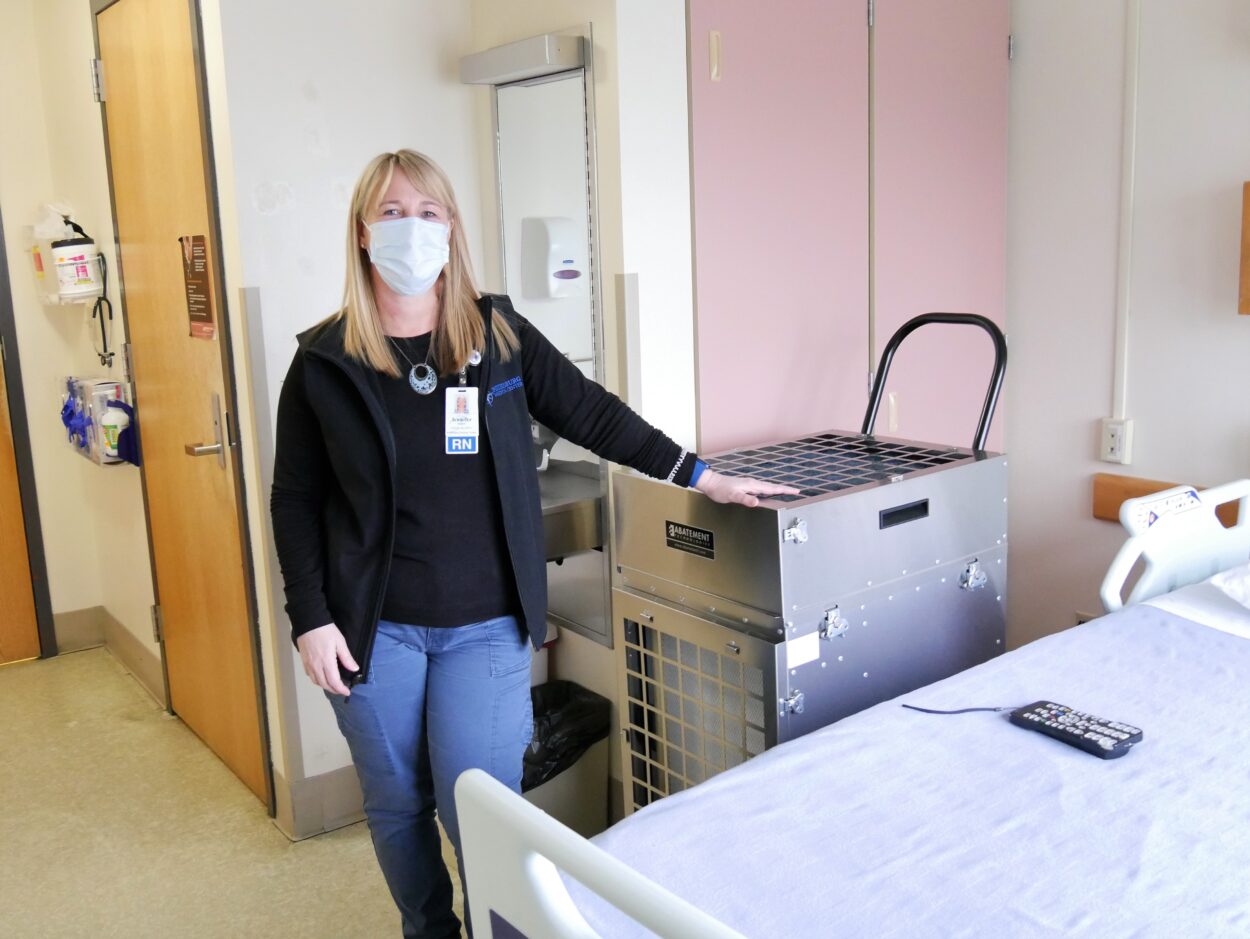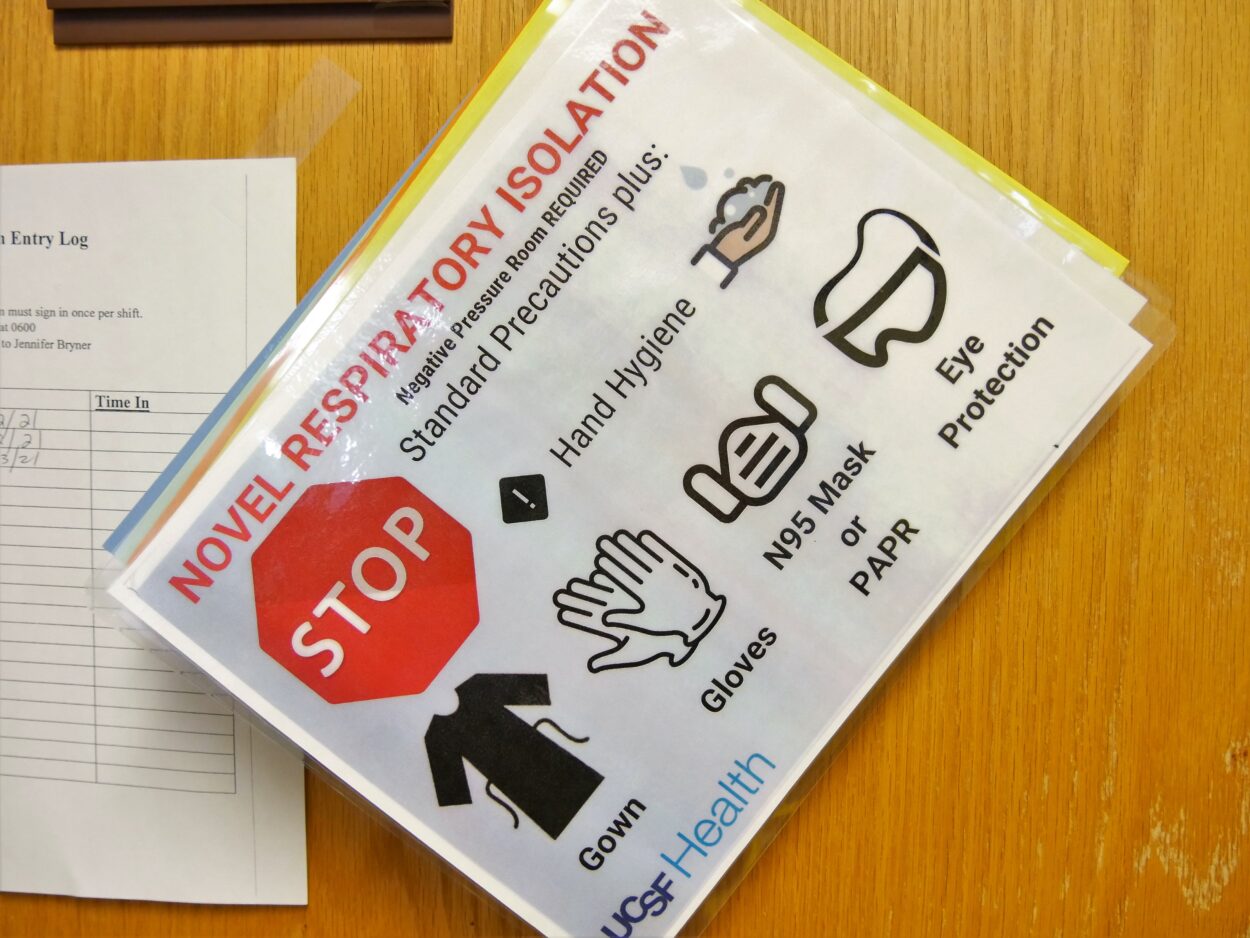
While some Petersburg residents with COVID-19 have been getting treated by home health nurses at home many also receive care at Petersburg Medical Center. There were nearly 30 monoclonal antibody treatments done in the month of November. KFSK’s Angela Denning takes us into the hospital to find out more about those treatments.
During the peak of the outbreak, the local hospital was giving multiple monoclonal antibody treatments a day. Each one takes four hours from start to finish. The patients are hooked up to an IV in a hospital room under constant nurse supervision.
Monoclonal antibodies are laboratory made proteins. According to the FDA, they help mimic the immune system’s ability to fight viruses. Getting them through an IV requires negative pressure rooms or isolation rooms to keep disease from spreading outside but PMC only has one of those.
By using an air purifier machine the size of a dishwasher, hospital staff figured out a way to make other in-patient rooms safe for COVID patients and the treatments.
“One of the windows has a vent and then we have one of these machines that pulls the air in, scrubs it and cleans it, and then pushes the air out so it keeps this air flow going,” said PMC’s Nurse Manager, Jennifer Bryner.
The machine has allowed them to create five beds for COVID patents, doubling up in some rooms.
The week before Thanksgiving was particularly busy. Many patients needed more than the monoclonal antibodies. They needed oxygen and would stay one to three nights in the hospital. Some were medevace’d. PMC does not have an ICU so patients needing ventilators are sent out.
Bryner says nurses have been extra busy because COVID care comes on top of their other regular patients.
“It’s tight and everybody is tired and working a lot of hours… and feeling very tired…and sometimes a little defeated,” she said.
It gets personal for Bryner. She grew up in Petersburg and knows almost everyone and their extended family. And that closeness is a double edged sword.
“It’s the greatest privilege to take care of your friends and family and neighbors but it also is a lot harder,” Bryner said. “With all the division that we’ve been seeing and different camps and then you go to the grocery store and you know somebody is sick and you see them walking around without their mask on. And it’s really hard to keep it in because we have to protect our patient’s privacy and so we can’t say or do anything and sometimes you want to just. . . stomp up and down, I think.”

Monoclonal antibody treatments are under emergency authorization so they’re not given to everyone, only those who are at high risk for getting really sick. One of those risk factors is being unvaccinated.
“Nearly all of the monoclonals that we’ve given are generally with unvaccinated people,” Bryner said. “If people who are vaccinated and are older or who have real severe risk factors then they get it as well. But by and large most of the people who stay with us are unvaccinated.”
Bryner says some people ask for the treatment themselves but the physicians make the final decision. For the most part, she says people have been more open to the treatment than they are getting vaccinated.
“It’s interesting to me because one of the reasons people don’t want to have a vaccine is because they don’t want different substances in their body or they’re worried about these emergency use or unauthorized vaccines, which they’re all not emergency use anymore,” Bryner said. “But the monoclonal antibody is actually probably higher risk and is still under emergency use.”
Still, the treatment has helped dozens of Petersburg residents recover from COVID. At least those that get it early enough. It can’t work if the virus has overtaken the body too much. With this latest outbreak, Bryner says some people waited with the hopes that they’d get better on their own.
“You know, they’ve been sick 6, 7, 8, 9, 10 days. They think they can ride it out. And all of a sudden they can’t breathe,” Bryner said. “So, they come in and they want treatment but once they’re to that state they don’t get the monoclonal antibody treatment anymore because they’re hospitalized.”
PMC is getting some temporary help from four FEMA nurses.
Bryner says the timing of the outbreak has been pretty good because it came later than most of the state so more ICU beds have opened up in Anchorage to send patents to.
But all in all, she says, she’s worked harder during this COVID outbreak than she ever has in the 25 years she’s been a nurse.











